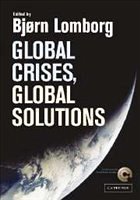Nicht lieferbar

Global Crises, Global Solutions
Versandkostenfrei!
Nicht lieferbar
Short description/annotationLeading economists, including three Nobel prize winners, evaluate ten serious global challenges.Main descriptionA unique publication exploring the opportunities for addressing ten of the most serious challenges facing the world today: Climate Change, Communicable Diseases, Conflicts, Education, Financial Instability, Corruption, Migration, Malnutrition and Hunger, Trade Barriers, Access to Water. In a world fraught with problems and challenges, we need to gauge how to achieve the greatest good with our money. Global Crises, Global Solutions provides a rich set of ar...
Short description/annotation
Leading economists, including three Nobel prize winners, evaluate ten serious global challenges.
Main description
A unique publication exploring the opportunities for addressing ten of the most serious challenges facing the world today: Climate Change, Communicable Diseases, Conflicts, Education, Financial Instability, Corruption, Migration, Malnutrition and Hunger, Trade Barriers, Access to Water. In a world fraught with problems and challenges, we need to gauge how to achieve the greatest good with our money. Global Crises, Global Solutions provides a rich set of arguments and data for prioritising our response most effectively. Each problem is introduced by a world-renowned expert defining the scale of the problem and describing the costs and benefits of a range of policy options to improve the situation. Each challenge is evaluated by economists from North America, Europe and China who attempt a ranking of the most promising options. Whether you agree or disagree with the analysis or conclusions, Global Crises, Global Solutions provides a serious, yet accessible, springboard for debate and discussion.
Table of contents:
List of figures; List of tables; List of boxes; Preface; List of contributors; List of abbreviations and acronyms; Introduction Bjørn Lomborg; Part I. The Challenges: 1. Climate change William Cline; Alternative perspectives 1.1 Robert Mendelsohn 1.2 Alan S. Manne; 2. Communicable diseases Anne Mills and Sam Shilcutt; Alternative perspectives 2.1 David B. Evans 2.2 Jacques van der Gaag; 3. Conflicts and arms proliferation Paul Collier and Anke Hoeffler; Alternative perspectives 3.1 Michael D. Intraligator 3.2 Tony Addison; 4. Access to education Lant Pritchett; Alternative perspectives 4.1 T. Paul Schultz 4.2 Ludger Wöbmann; 5. Financial instability Barry Eichengreen; Alternative perspectives 5.1 Charles Wyplosz; 5.2 Peter Blair Henry; 6. Governance and corruption Susan Rose-Ackerman; Alternative perspectives 6.1 Jens Christopher Andvig; 6.2 Jean Cartier-Bresson; 7. Malnutrition and hunger Jere R. Behrman, Harold Alderman and John Hoddinott; Alternative perspectives 7.1 Peter Svedberg; 7.2 Simon Appleton; 8. Migration Philip Martin; Alternative perspectives 8.1 Mark Rosenzweig 8.2 Roger Böhning; 9. Sanitation and access to clean water Frank Rijsberman; Alternative perspectives 9.1 John J. Boland 9.2 Henry Vaux, Jr. 10. Subsidies and trade barriers Kym Anderson; Alternative perspectives 10.1 Jan Pronk 10.2 Arvind Panagariya; Part II. Ranking the Opportunities: Jagdish Bhagwati, Robert Fogel, Bruno Frey, Justin Yifu Lin, Douglass North, Thomas Schelling, Vernon Smith and Nancy Stokey; Expert Panel; Youth Parliament; Index.
Leading economists, including three Nobel prize winners, evaluate ten serious global challenges.
Main description
A unique publication exploring the opportunities for addressing ten of the most serious challenges facing the world today: Climate Change, Communicable Diseases, Conflicts, Education, Financial Instability, Corruption, Migration, Malnutrition and Hunger, Trade Barriers, Access to Water. In a world fraught with problems and challenges, we need to gauge how to achieve the greatest good with our money. Global Crises, Global Solutions provides a rich set of arguments and data for prioritising our response most effectively. Each problem is introduced by a world-renowned expert defining the scale of the problem and describing the costs and benefits of a range of policy options to improve the situation. Each challenge is evaluated by economists from North America, Europe and China who attempt a ranking of the most promising options. Whether you agree or disagree with the analysis or conclusions, Global Crises, Global Solutions provides a serious, yet accessible, springboard for debate and discussion.
Table of contents:
List of figures; List of tables; List of boxes; Preface; List of contributors; List of abbreviations and acronyms; Introduction Bjørn Lomborg; Part I. The Challenges: 1. Climate change William Cline; Alternative perspectives 1.1 Robert Mendelsohn 1.2 Alan S. Manne; 2. Communicable diseases Anne Mills and Sam Shilcutt; Alternative perspectives 2.1 David B. Evans 2.2 Jacques van der Gaag; 3. Conflicts and arms proliferation Paul Collier and Anke Hoeffler; Alternative perspectives 3.1 Michael D. Intraligator 3.2 Tony Addison; 4. Access to education Lant Pritchett; Alternative perspectives 4.1 T. Paul Schultz 4.2 Ludger Wöbmann; 5. Financial instability Barry Eichengreen; Alternative perspectives 5.1 Charles Wyplosz; 5.2 Peter Blair Henry; 6. Governance and corruption Susan Rose-Ackerman; Alternative perspectives 6.1 Jens Christopher Andvig; 6.2 Jean Cartier-Bresson; 7. Malnutrition and hunger Jere R. Behrman, Harold Alderman and John Hoddinott; Alternative perspectives 7.1 Peter Svedberg; 7.2 Simon Appleton; 8. Migration Philip Martin; Alternative perspectives 8.1 Mark Rosenzweig 8.2 Roger Böhning; 9. Sanitation and access to clean water Frank Rijsberman; Alternative perspectives 9.1 John J. Boland 9.2 Henry Vaux, Jr. 10. Subsidies and trade barriers Kym Anderson; Alternative perspectives 10.1 Jan Pronk 10.2 Arvind Panagariya; Part II. Ranking the Opportunities: Jagdish Bhagwati, Robert Fogel, Bruno Frey, Justin Yifu Lin, Douglass North, Thomas Schelling, Vernon Smith and Nancy Stokey; Expert Panel; Youth Parliament; Index.




